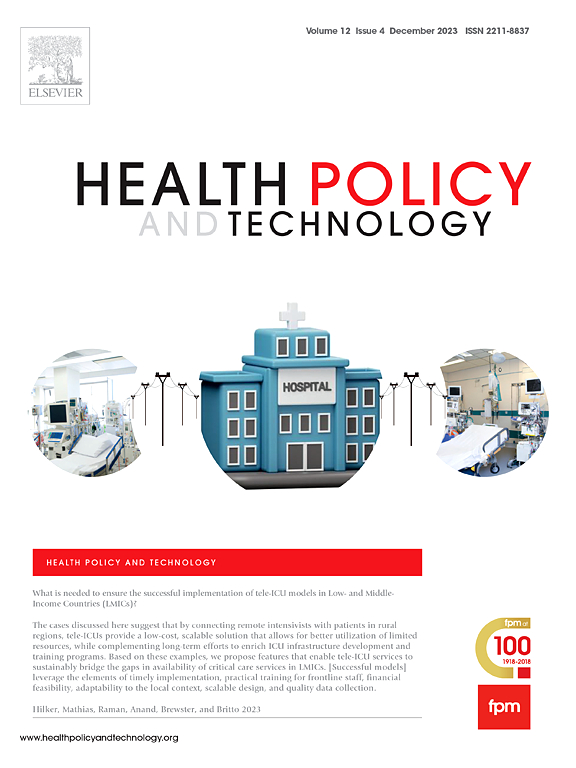在伦理困境和政策相关的复杂决策中使用ChatGPT:我们准备好了吗?
IF 3.7
3区 医学
Q1 HEALTH POLICY & SERVICES
引用次数: 0
摘要
使用语言模型的人工智能(AI)算法已经成为医学中有价值的工具。虽然人工智能已经证明了它解决临床问题的能力,但它在伦理困境中的应用仍存在争议。一些人认为,人工智能可以综合各种信息,形成一个全面的视角,而另一些人则告诫不要过早依赖。本研究探讨了人工智能在解决医生面临的伦理医学困境方面的潜力,从理论讨论过渡到实际解决方案。方法提出了与国家卫生政策决策相关的三个社会伦理困境,并将其与医生和现实世界决策的反应进行了比较。这些困境包括以下问题:(1)资源有限时的技术分配标准;(2)个性化治疗;(3)患者要求与卫生组织策略之间的冲突。结果schatgpt -3.5与医生对预算分配的看法一致,但在与年龄相关的标准上存在分歧。它努力解决患者偏好和组织策略之间的冲突。它的反应反映了医生的家长式作风和私人市场的观点,强调系统范围的利益(功利主义方法),可能是由于对私人医疗保健系统的熟悉。结论:atgpt -3.5显示了处理复杂医学伦理困境的不断发展的能力,但也揭示了偏见和局限性。政策制定者必须仔细整合人工智能工具,在确保适应不同情景的同时,纳入更广泛的经济和社会见解。学术界和临床医生必须保持警惕,并在日益不确定和不断发展的医疗保健环境中规范人工智能的快速实施。本文章由计算机程序翻译,如有差异,请以英文原文为准。
Using ChatGPT in ethical dilemmas and policy-related complex decision making: Are we ready yet?
Background and Objective
Artificial intelligence (AI) algorithms using language models have emerged as valuable tools in medicine. While AI has demonstrated its ability to address clinical questions, its application in ethical dilemmas remains debated. Some argue that AI can synthesize diverse information to form a comprehensive perspective, while others caution against premature reliance. This study explored the potential of AI in addressing ethical medical dilemmas faced by physicians, transitioning from theoretical discussions to practical solutions.
Methods
ChatGPT-3.5 was presented with three socio-ethical dilemmas relevant to national health policy decisions, and its responses were compared to those of physicians and real-world decisions. The dilemmas included questions on (1) criteria for allocation of technologies when resources are limited (2) personalized treatment, and (3) conflicts between patient requests and health organizations' strategy.
Results
ChatGPT-3.5 aligned with physicians' views on budget allocation but diverged on age-related criteria. It struggled to resolve conflicts between patient preferences and organizational strategies. Its responses reflected physician paternalism and a private market perspective, emphasizing system-wide benefit (utilitarian approach), likely due to familiarity with private healthcare systems.
Conclusions
ChatGPT-3.5 demonstrated an evolving capacity to engage with complex medico-ethical dilemmas but also revealed biases and limitations. Policymakers must carefully integrate AI tools, incorporating broader economic and social insights while ensuring adaptability to diverse scenarios. The academic community and clinicians must remain vigilant and regulate the rapid implementation of AI in the increasingly uncertain and evolving healthcare landscape.
求助全文
通过发布文献求助,成功后即可免费获取论文全文。
去求助
来源期刊

Health Policy and Technology
Medicine-Health Policy
CiteScore
9.20
自引率
3.30%
发文量
78
审稿时长
88 days
期刊介绍:
Health Policy and Technology (HPT), is the official journal of the Fellowship of Postgraduate Medicine (FPM), a cross-disciplinary journal, which focuses on past, present and future health policy and the role of technology in clinical and non-clinical national and international health environments.
HPT provides a further excellent way for the FPM to continue to make important national and international contributions to development of policy and practice within medicine and related disciplines. The aim of HPT is to publish relevant, timely and accessible articles and commentaries to support policy-makers, health professionals, health technology providers, patient groups and academia interested in health policy and technology.
Topics covered by HPT will include:
- Health technology, including drug discovery, diagnostics, medicines, devices, therapeutic delivery and eHealth systems
- Cross-national comparisons on health policy using evidence-based approaches
- National studies on health policy to determine the outcomes of technology-driven initiatives
- Cross-border eHealth including health tourism
- The digital divide in mobility, access and affordability of healthcare
- Health technology assessment (HTA) methods and tools for evaluating the effectiveness of clinical and non-clinical health technologies
- Health and eHealth indicators and benchmarks (measure/metrics) for understanding the adoption and diffusion of health technologies
- Health and eHealth models and frameworks to support policy-makers and other stakeholders in decision-making
- Stakeholder engagement with health technologies (clinical and patient/citizen buy-in)
- Regulation and health economics
 求助内容:
求助内容: 应助结果提醒方式:
应助结果提醒方式:


